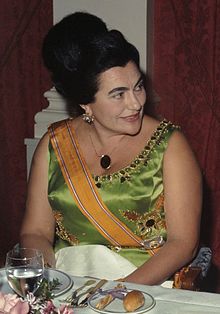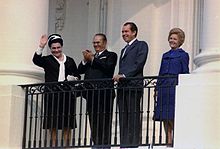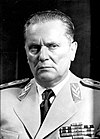Jovanka Broz

Jovanka Broz | |
|---|---|
| Јованка Броз | |
 | |
| First Lady of Yugoslavia | |
| In role 14 January 1953 – 4 May 1980 | |
| Personal details | |
| Born | Jovanka Budisavljević 7 December 1924 Pećane near Udbina, Kingdom of Serbs, Croats and Slovenes (now Croatia) |
| Died | 20 October 2013 (aged 88) Belgrade, Serbia |
| Resting place | House of Flowers, Belgrade, Serbia 44°47′12.21″N 20°27′6.1″E / 44.7867250°N 20.451694°E |
| Nationality | Yugoslav |
| Spouse | |
| Parents |
|
| Awards | |
| Military service | |
| Allegiance | Yugoslavia |
| Branch/service | Yugoslav Partisans Yugoslav People's Army |
| Years of service | 1941–52 |
| Rank | Lieutenant colonel |
| Battles/wars | World War II |
Jovanka Broz (née Budisavljević; Serbian Cyrillic: Јованка Броз, née Будисављевић; 7 December 1924 – 20 October 2013) was the First Lady of Yugoslavia as the wife of Yugoslav president Josip Broz Tito. She was a lieutenant colonel in the Yugoslav People's Army.
She was married to Tito from 1952 until his death in 1980. Following her husband's death, all of her property was seized and she moved to a state-owned villa, where she reportedly lived under virtual house arrest.[2][3]
Early life
[edit]Jovanka Budisavljević was born on 7 December 1924, to an ethnic Serb family of Milica (née Svilar) and Milan "Mićo" Budisavljević in Pećane near Udbina, in the historical Krbava and Lika regions of Croatia, at the time part of the Kingdom of Serbs, Croats and Slovenes.[4][5] In April 1941, when World War II started in Yugoslavia, the Budisavljević family was forced to flee the violently anti-Serb Ustaše regime of the Independent State of Croatia, which targeted one third of the prečani Serbs for forced conversion to Catholicism, another third for expulsion and the final third for extermination. The family's house was eventually burned down by the Ustaše troops.[6] She joined the Yugoslav Partisans shortly thereafter, at the age of 17.[4]
Life with and around Tito
[edit]
Former JNA General Marjan Kranjc says Jovanka was assigned to the Marshal as early as 1945 as part of the personnel that checked his food and overall cleanliness for the purpose of preventing disease. After the death of Tito's great love Davorjanka Paunović, whose grave is in the Royal Compound in Dedinje, in 1946, Jovanka became his personal secretary according to Kranjc. "In this way she became a part of the inner most security ring around Tito and had to sign a secret cooperation agreement with the State Security Service (SDB), which was the law" - says Kranjc.[7]
Initial relationship
[edit]Milovan Đilas, one of the communist revolutionary movement's leading members and ideologues, and a subsequent dissident, provides more details about Jovanka during this period in Druženje s Titom (Friendship with Tito). According to him, the relationship with Tito was extremely difficult for her:[8]
She never appeared outside of Tito's company. We'd see her many times as she was keeping a vigil for hours in a hallway [while we're holding a late-night meeting inside], to make sure she is available if Tito needs anything as he's going to sleep. Because of that, the wrath and the lack of trust she was receiving from other servants was almost inevitable. [According to what was on offer] the motives for her closeness to Tito could've been explained in endless ways, none of which would show her character in a good light: career climbing, cajolery, malicious female extravagance, exploitation of Tito's lonesomeness... As far as she was concerned, Tito was a war and communist party deity for whom everyone was supposed to sacrifice everything they had. She was a woman deep in the process of comprehending Tito as a man, while also increasingly and devotedly falling in love with him. She was resigned to burn out or fade away, unknown and unrecognized if need be, next to the divine man about whom she dreamt and to whom she could only belong now that he has chosen her.
Marriage
[edit]
The exact date of their marriage is also subject to debate. The secret wedding ceremony happened either during 1951 or in April 1952; however, the location of the ceremony is also not clear. Some sources say it took place in the Dunavka villa in Ilok while others list Belgrade's municipality of Čukarica as the location.[9]
Deterioration
[edit]
Many believed her to be a victim of the ambitions of various politicians who managed to manipulate the ageing Marshal into turning against his wife. Ivo Eterović, a writer and photographer with unprecedented decades-long access to Yugoslavia's ruling couple, stated "the main culprits for the Tito-Jovanka split are that pig Stane Dolanc and General Nikola Ljubičić".[7] In 1975, Tito left their common home, and she did not see him from 1977 to 1980 when he died.[5] After Marshal Tito's death she lived in seclusion in Dedinje, a Belgrade suburb, under house arrest.[4] The house was in a very bad condition; nobody cared to repair anything. The roof was leaking, she did not have her pension or her documents (ID and passport and health insurance card). She lived without heating for eight years. She got her ID and passport in 2009. They took her car, so she was not able to go to her husband's grave when she wanted. The government had to be notified if she left the house. She had practically no human rights for 30 years.
Death
[edit]
Broz was hospitalized on 23 August 2013, and died from a heart attack in a Belgrade hospital on 20 October 2013, aged 88.[4] She was buried in the House of Flowers mausoleum near her husband's grave.
Memoirs
[edit]The book titled My Life, My Truth was released three weeks before she died.[when?]
Honours
[edit] France : Dame Grand Cross of the National Order of Merit (8 May 1956).[1]
France : Dame Grand Cross of the National Order of Merit (8 May 1956).[1] Netherlands : Dame Grand Cross of the Order of the Crown (22 October 1970).[10]
Netherlands : Dame Grand Cross of the Order of the Crown (22 October 1970).[10] Iran : Commemorative Medal of the 2500th Anniversary of the founding of the Persian Empire (14 October 1971).[11][12]
Iran : Commemorative Medal of the 2500th Anniversary of the founding of the Persian Empire (14 October 1971).[11][12] Nepalese Royal Family: Member First Class of the Most Illustrious Order of the Three Divine Powers (2 February 1974).[13]
Nepalese Royal Family: Member First Class of the Most Illustrious Order of the Three Divine Powers (2 February 1974).[13]
References in popular culture
[edit]In the British television series Doctor Who, the fictional character of Tegan Jovanka, one of the companions of the Fourth and Fifth Doctors, and one of the longest running companions of the Doctor, got the name as a combination of Tegan, named by one of the producers' niece, and Jovanka, after Jovanka Broz.
References
[edit]- ^ a b Povodom smrti Jovanke Broz: Nepravda ostaje (see video) (in Serbian)
- ^ Sekularac, Ivana; Vasovic, Aleksandar (21 October 2013). "Tito's widow Jovanka Broz dies aged 88". The Independent. Reuters. Archived from the original on 2022-06-17. Retrieved 8 July 2015.
- ^ "Jovanka Broz, widow of Yugoslav communist dictator Tito, dies at 88". The Washington Post. Associated Press. 20 October 2013. Archived from the original on 15 November 2018.
- ^ a b c d Tito's widow, Jovanka Broz, dies in Belgrade, aged 88 BBC. 20 October 2013. Retrieved 16 December 2013.
- ^ a b "Jovanka Broz, first wife of a Communist leader, dies". Tandem Post. 21 October 2013. Archived from the original on 17 December 2013. Retrieved 16 December 2013.
- ^ Društvo|Novosti Archived 2009-03-21 at the Wayback Machine (in Serbian)
- ^ a b Vreme 800 - Portret savremenika – Jovanka Broz: Tajna sa Dedinja (in Serbian)
- ^ Milovan Đilas. Druženje s Titom [Friendship with Tito] (in Serbian).[page needed]
- ^ Blic Online | Titova udovica daleko od očiju javnosti Archived 2009-12-14 at the Wayback Machine (in Serbian)
- ^ National Archief
- ^ Badraie Archived 2016-03-05 at the Wayback Machine
- ^ "Badraie". Archived from the original on 2016-03-06. Retrieved 2014-03-23.
- ^ Alamy
External links
[edit]![]() Media related to Jovanka Broz at Wikimedia Commons
Media related to Jovanka Broz at Wikimedia Commons
